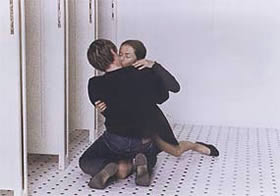
|
La Pianiste Film ReviewAugust 27, 2002
The realm of classical music is often seen as an austere and perfect thing, representative of some of the highest moral planes the human race has ever reached. This is especially true in a country like Austria, where the history of the music is inextricably bound to the culture, in particular to the identity of the elite. But in Michael Haneke's harrowing La Pianiste (The Piano Teacher), this milieu is but a thin veneer papering over a much darker side of the human heart. Here, the music's elegant beauty plays delicate counterpoint to some of the more base and degrading aspects of Kultur in a sharp film that dispassionately observes its subjects while at the same time making the audience complicit in their actions. Haneke is an uncompromising filmmaker whose non-escapist sense has generally resulted in his work being only rarely shown here in the United States. His films tend to expose the violent and ugly little moments that all too frequently comprise the interactions of human beings in a manner diametrically opposed to Hollywood's overblown depictions of cartoonish mayhem. The director's clinical view depicts an unyielding sense of reality that skewers the notion of film as an escape from the troubles of existence; instead of offering any pat solutions or explanations, his on-screen world is instead a place where the rough and sometimes vicious actuality of real life is seen in its many ambiguous and malevolent forms. In La Pianiste, the story involves a neurotic woman (played by the inestimable Isabelle Huppert) who coolly indoctrinates students in the art of Schubert when she's not visiting hardcore peep booths or slitting herself with a razor. One student in particular (Benoit Magimel) takes an unfortunate fancy to the woman, and is thus led into a strange and sadomasochistic relationship with the pathological keyboard instructor. This tale is taken from a book by the Austrian Elfriede Jeliken, a novelist whose work has been attacked for its supposedly degenerate nature by those unwilling to see beyond its pornographic trappings. In the hands of lesser artists than these, it might be that the sexual deviancy of the piece would be the focus of the work instead of the extraneous sidebar it is here, but with Haneke and Huppert tackling Jeliken's difficult material, the result is far more riveting and incisive than your average banal obscenity. The lead actress' distinctive performance should be noted for its exceptional nature, as it was well worthy of the Best Actress award that was bestowed upon her for the film at the 2001 Cannes Film Festival. The singular Huppert has already had a long and historic career in the craft, and with this role shows precisely why she is considered one of the greatest working actresses today. The range that she displays is exactly analogous to the varied tones that can be brought out by the 88 keys of the instrument her character teaches; she is by turns both vulnerable and aggressive, victim as well as perpetrator. At times you tend to sympathize compassionately, but at others your sensibilities are repulsed by the murky nastiness of her actions and unsettled by her psychological instabilities. There are few actresses living who could tackle the disturbing and demanding part of Erika Kohut and triumph in it the way this Frenchwoman does, and in fact it is said that Haneke had little interest in making La Pianiste if Huppert was uninterested. After having witnessed the results of the collaboration, it is patently obvious that in this decision, the director's choice was clear-eyed and unerring. But it is not only in selecting the perfect lead for his film where Haneke's acute discernment utterly serves his aims. In fact, this sense underpins the whole of this severe postmodern fable, a harsh work that the man himself has described as a "parody of a melodrama". There is no simple retreat from the unpleasant exigencies of a callous universe in the cinematic frames of this director's biting vision; instead, the viewer is made partner in observing the characters interact with the cold, scientific gaze of an entomologist impaling a bug on a needle. Sometimes you are left completely to your own devices to interpret events and actions and glean your own meaning from them. In one particular scene, a still camera shot just shows Huppert's back for a relatively long time as she is reacting to something, but since you can't see her facial expressions, the burden is placed upon the viewer to create his or her own impression of the character's emotions. To say that this nebulous style of storytelling is unlike the mainstream American way of making films is something of an understatement. Yet Haneke goes to great lengths to make clear that he does not hate Hollywood or its output at all. He is on record as saying that this type of cinema is perfectly fine, but that it simply does not gibe with his impressions of what art should be or do. His approach is merely more concerned with confronting what the world can be instead of running away from it into fanciful prevarications designed to convince an audience that things will be fine in the end. While this sometimes-brutal viewpoint certainly does not make for light and reassuring entertainment, the end result is a troubling work that often enlightens with its withering look at human relations. Film viewers who are not easily shaken by a look at our species with all its warts intact should avail themselves of the opportunity to see La Pianiste; if nothing else, the way this provocative, knife-edged work will challenge you to decide its meaning on your own makes it worth the oft-times burdensome responsibility of engaging in the venture.
|
Thursday, January 08, 2026
© 2006 Box Office Prophets, a division of One Of Us, Inc.